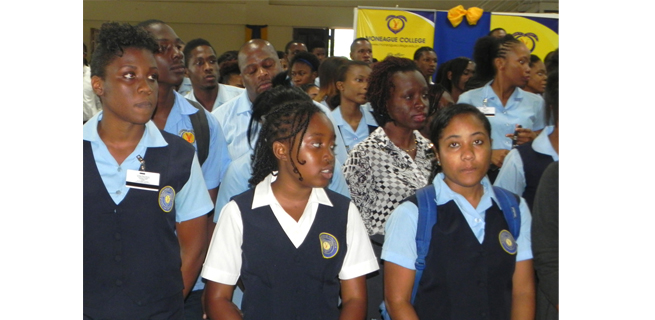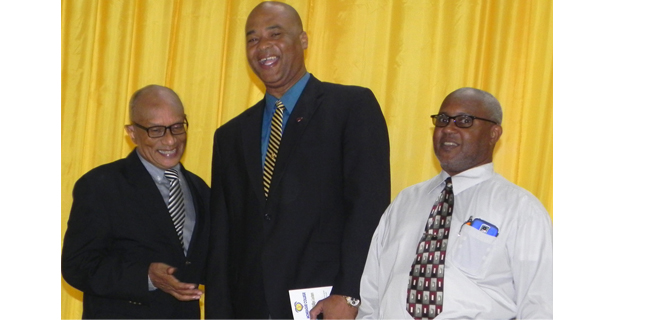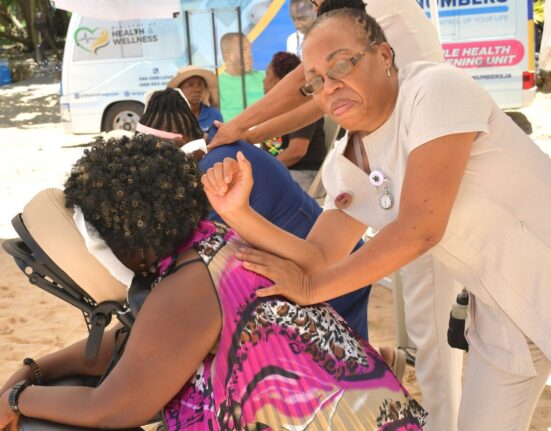Executive director of National Integrity Action (NIA), Professor Trevor Munroe has stated that at the pinnacle of the global financial system meltdown between 2008 and 2009, there was a lack of integrity among the private sector across the world. He continued to explain that this lack of integrity is one of the reasons why countries such as Jamaica continue to feel the effects today, especially the close to forty percent of the young people who are faced with difficulties in finding jobs.
Professor Munroe was giving a lecture under the theme “Integrity: The ultimate guide to moral judgment, depth of character and quality leadership” at the third annual Aubrey Phillips Lecture held at the Gloria Johnson Multipurpose Hall at the Moneague College in Moneague, St. Ann on Thursday, November 12.
The late Aubrey Phillips was the first principal of Moneague Teachers’ College when it opened its doors in January 1965 as an Emergency Teacher Training College. He was an unassuming person of great humility, integrity and respect for people in every stratum of society. He is the father of Dr. Peter Phillips, the Minister of Finance of Jamaica.
In giving his lecture, Professor Munroe told the audience, consisting mainly of students from Moneague College, that the theme of integrity was very timely, because it was an important fundamental guiding principle if Jamaicans are “to pull ourselves out of the crisis that is making life so much difficult for even the younger generation.”
He noted that this crisis of unemployment faced by young people and the harsh global economic climate was as a result of the absence of integrity among the financial sector of the globe. “In 2008 to 2009, a financial crisis engulfed the whole world and that financial crisis brought about massive job loss and loss of income for millions of people… What was one of the main causes of that crisis that affects us even today? The United States government established a commission of enquiry to look into the source of the crisis and the report of that commission stated that ‘The main cause was systematic breakdown in accountability and ethics.’ In other words, greed, fraud, lack of integrity and corruption are main causes of that crisis,” he said.
He also told the audience that the lack of integrity does not only apply to the financial sector and politicians, but noted that the world of sports, with football and athletics, with the recent allegations of corruption against former head of the International Association of Athletics Federation (IAAF), Lamine Diack also face lack of integrity.
LACK OF INTEGRITY IN JAMAICA
In Jamaica, Professor Munroe delved into the Jamaican electoral system and integrity and touched on a study carried out by the University of the West Indies (UWI) prior to the 2011 general election in various constituencies across the island. That study revealed that 59 percent of persons have been involved in vote buying or vote selling. However, he said that it was notable that 41 percent refused to participate in vote buying, something he implored persons to adopt.
On that same point, Professor Munroe condemned Opposition Leader Andrew Holness for comments made at a political rally in Spanish Town on Sunday, November 8. “I was amazed at a report in the Daily Observer on Tuesday, November 10 and when I looked at a headline it read “Nyam dem out and vote dem out.” That was the headline. The report in part said the Leader of Opposition told his supporters ‘Tek di money and ask fi more.’ Is this encouraging integrity among young people? Is this encouraging integrity in the buyers of the vote?… I say to you any encouragement to take a bribe is obviously unacceptable and it is wrong and must be dealt with. Any attempt to buy votes by the PNP or by any other party is wrong and is unacceptable and must be condemned. Both the buyer and the seller must face the full force of the law,” Professor Munroe told the audience.
YOUNG PEOPLE MUST VALUE THEIR INTEGRITY
Professor Trevor Munroe told the students gathered at the lecture to value their integrity and to follow in the footsteps of other persons who kept their integrity and principle close. He used examples of such persons as Nelson Mandela and Norman Washington Manley.
He gave examples of young persons who also have played their part in preserving their own integrity and fought for integrity. He gave examples of Malala Yousafzai, a young Pakistani girl who defied the Taliban in Pakistan and demanded that girls be allowed to receive an education. She was shot in the head by a Taliban gunman in 2012, but survived and through her continued activism, young girls in Pakistan are now entitled to take part in the education system. She was the co-recipient of the 2014 Nobel Peace Prize for her struggles.
Professor Munroe in closing stressed the importance of character education and told the audience especially those students present to maintain their ethics, be mindful, resilient and courageous, be leaders and be curious in probing issues that affected them. “I believe that there can be a social movement for integrity in this country among the young people, private and public sector… If we are to move ahead with this social development, then so many of our young people would not want to leave our country,” he stressed. “There is nothing wrong with Jamaica that cannot be fixed,” he concluded.
Several individuals brought greetings at the Aubrey Phillips Lecture. They included Howard Isaacs, principal of the Moneague College and Mickael Phillips, member of parliament for North West Manchester and grandson of the late Aubrey Phillips. Moderator of the lecture was Marlene Forrester, lecturer in the Faculty of Education at Monegue College. The proceedings opened with prayer from Rev. Michael Llewellyn, vice chairman of the college.









